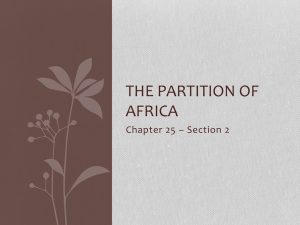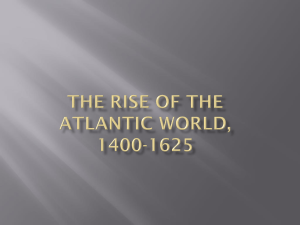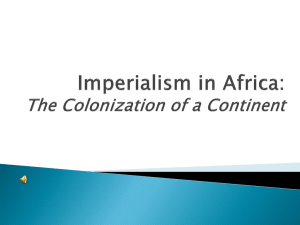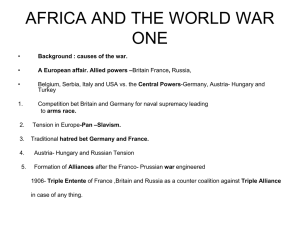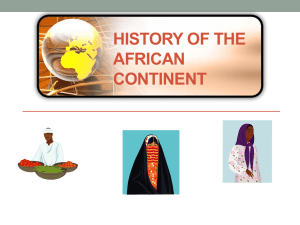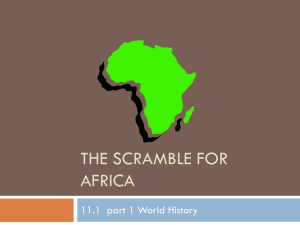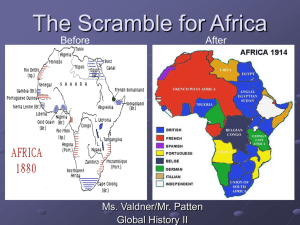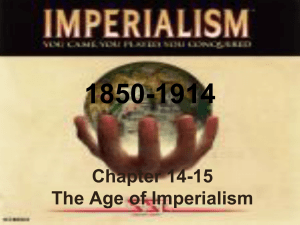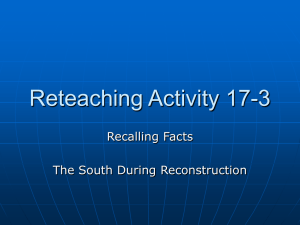Industrialization, the World Economy, and Competition between
advertisement
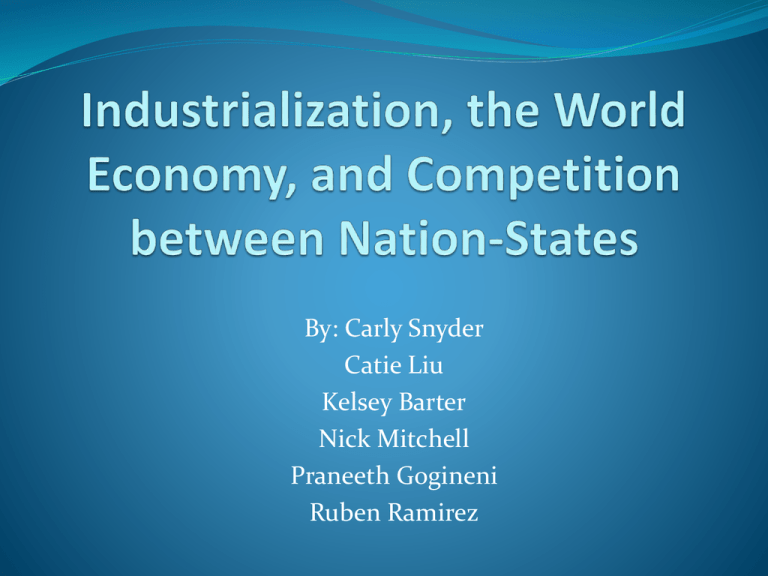
By: Carly Snyder Catie Liu Kelsey Barter Nick Mitchell Praneeth Gogineni Ruben Ramirez Ruben Ramirez and Praneeth Gogineni Industrialization and the World Economy Created a growing and dynamic economic system in Great Britain, Continental Europe, and in North America System spread throughout the world in the 19th century Some countries liked the system because of the products and techniques that the West had to offer If peaceful methods failed, they would bring in armies to convince non-Western nations to adopt their economic systems In general, Westerners fashioned the global economy so that they got the largest share of trade, technology and migration The Rise of Global Inequality The ultimate significance of the Industrial Revolution was that it allowed industrialized regions to increase their wealth and power enormously This caused a gap to form between industrialized regions, mainly Europe and North America, and unindustrialized regions such as Africa and Latin America This uneven structure was built into the world economy and created a “lopsided world” Economists compared the average incomes in “developed” regions to “undeveloped” and came up with this graph The average standard of living in 1750 was the same and in 1970 the richest countries made about 25 times more than the third world countries Industrialization was the cause of the giant gap The third world countries stagnated in 1913 and did not pick back up until 1945 The increase in economic success effected food, clothing, health, education, life expectancy, and material wellbeing The World Market In 1913, 25 times as much commerce as in 1800. Value of World Trade – $ 38 Billion Britain used trade to tie together world economy. Since they had colonies in India, Canada, Australia, and other small places. Ex: Cotton in 1820: Britain buying 50% and exporting 50%, in 1850 India buying 25% of cotton, with Europe only @ 16%. After repeal of Corn Laws – Britain becomes best single market. Growth of Trade Helped by the growth of Railroads Earliest Railroad construction in Europe and in America North of the Rio Grande. By 1920 more than 25% of RR were in Latin America, Asia, Africa, and Australia. Much of this railroad building, connected seaports with inland cities and regions. Power of steam revolutionized transportation. Steel replaced Iron (which had previously replaced Wood) in propellers. These new revolutions in transportation helped discover new land. Trade Other continents also being to ship new materials such as: jute, rubber, cotton, and coconut oil, along with the old staples: spices, tea, sugar, coffee. Intercontinental trade facilitated by Suez and Panama Canals. – Great Importance, lots of development. All this trade encouraged expanding investments. By WWI Europeans invested $40 Billion Most of capital exported did not go to European Colonies, instead about 75% went to European Nations. Europeans allowed white males in colonies to buy cheap foods and raw materials, and this was beneficial, except for the Native Americans. Kelsey Barter and Catie Liu Pre-1880’s Situation Europe controlled approx. 10% of African continent French began conquering Algeria in 1830’s Substantial number of French, Italian, Spanish colonists European explorers reached source of Nile by 1862; later, Niger Found riches within Africa Set up plantations, used local labor European ports dating back to Exploration existed on the West African Coast; Portugal ineffectively controlled Angola and Mozambique (SE coast) British v. Dutch Britain took control of Dutch Settlements in South Africa during Napoleonic Wars Upset Dutch farmers 1835: Dutch made “Great Trek” into interior Fought Zulu and Xhosa people for land Afrikaners (also called Boers) Descendents of Dutch in Cape Colony, S. Africa • 1853 – Afrikaners proclaimed political independence, defended themselves against British armies Hatred between Afrikaners and British • 1880 – Afrikaners and British colonists gained control of S. Africa from indigenous people Conquer of Africa Britain, France, Germany, Italy, Portugal, Belgium, and Spain competed for control of Africa Almost completely partitioned by 1900 Only independent nations were Ethiopia (NE) and Liberia (E Coast) British in S. Africa led by Cecil Rhodes skipped over Afrikaner states to control Bechuanaland and Rhodesia Now Botswana, Zimbabwe and Zambia British conquered Dutch in South African War (1899- 1902), bloody 1910 - territories united as the Union of South Africa, which was largely self-governing Allowed more numerous Afrikaners to gradually gain pol control Africa that Europeans conquered was technologically behind, politically divided Divisions of language/culture, conquest African turmoil – slaving gangs sent out by African rulers Some Africans resisted European conquest Europeans brutally crushed any resistance Most Africans gave in to Europeans easily 1914 – Europeans ruled all of Africa except Liberia and Ethiopia Partition of Africa British occupation of Egypt in 1882 Set new model of formal political occupation At first opposed formal partition Ended up with richest parts (S. Africa, Ghana, Nigeria) Leopold II of Belgium – focus on Central Afr. Not powerful in Europe but personally claimed Congo Formed a financial syndicate to send Henry Stanley (journalist) to the Congo Basin Established trading posts, signed “treaties” w/ natives Other nations soon followed suit France alarmed by Leopold II Led to 1880 French expedition under Pierre de Brazza, established protectorate on N. Bank of Congo River Bismarck (Germany) claimed portions of East and West Africa Created an overall gold rush mentality or “African Fever” by 1882 Berlin Conference International conference called by Bismarck and Jules Ferry of France to lay down rules of conquest of SubSaharan Africa in 1884 and 1885 Claims to African territory rest on “effective occupation” to be recognized Ensured nations would push relentlessly into the African interior No one nation could claim the continent Recognized Leopold’s personal rule over Congo Also worked to stop African slave trade and slavery Colonial Claims Berlin Conference = German emergence as imperial power Bismarck changed his position on colonies 1884, acquired areas of Togo, Cameroons, SW and E Africa German cooperation with France against Britain French pressed S from Algeria, N from Congo and E from forts on Senegal coast British expanded N from Cape Colony, W from Zanzibar Attempt to move S from Egypt stopped in Sudan by Muslims in 1885 1895-1898 - British forces under Horatio Kitchener moved more tactfully up the Nile River, defeating Muslim arrows with machine guns at Battle of Omdurman Eventual conquest of Sudan realized after French troops at the top of the Nile withdrew due to Dreyfus Affair Ended serious diplomatic crisis that might have caused war (French v. British rivalry) Afr/Euro Economic Relations Expanding output of industrialized European nations caused them to seek demand for surplus products Offered African merchants better credit terms Large quantities of goods traded between Europe and Africa Ivory, oil, wood, rubber 1890s – commercial change in Africa conducted by sea through European nations European political pressure increased cotton exports in Egypt Europeans powers taxed Africans, ordered communities into tribes Took land for plantations Used local labor Tribal states division of labor (legal protection on land/labor) Subsidence-based agriculture specialization, production of surplus White farmers in S. Africa exported provisions and animal products but couldn’t compete w/ African agriculture Diamond/gold mining exported to Europe for processing, sale Massive trade between Africa and Europe European competition Conditions in Africa Leopold II was brutal ruler Christian missionaries brought improvements After WWII, US wanted end to European imperialism Socialist African rulers aided by USSR, wanted self-rule European colonists tried to use force to maintain power, but eventually lost domestic support “Perhaps the Africans’ worst loss was not of land or power but self-respect” Nick Mitchell A “Civilizing Mission” The idea of many Europeans that, it is their duty to civilize non-European regions. An excuse for imperialists to continue expanding and a way to quell critics. Many Europeans believed missions would eventually bestow the modern economies, cities, advanced medicine, and higher standard of living to “primitive” areas of the world. A “Civilizing Mission” cont. Rudyard Kipling (1865-1936), masterfully rallied people in Europe and America to fulfill the “white man's burden.” The “burden” meaning it is the white mans’ responsibility to “civilize” the rest of the world. The idea of the “white man’s burden” played a major part in deciding to rule the Philippines rather then liberating it after the Spanish-American War. Proponents of imperialism believed that imperial rule protected natives from tribal warfare. A “Civilizing Mission” cont. As a result of peace and stability from European control, Christianity spread. In Africa, Protestant, Muslim, and Catholic missionaries all worked to convert, and educate. An example of conversion through missions are the Ibo people who became highly Christianized due to missionary actions. A “Civilizing Mission” cont. While there were occasional success with missionary efforts in Africa there was a general failure in other regions like India, China, and the Islamic world. The attempts to convert were mostly futile because the ethnicities they were trying to convert often had long standing religious beliefs. However, this did not stop them from continuing to try to convert people. Carly Snyder Conrad’s Heart of Darkness Written by Joseph Conrad One of the greatest pieces of English literature, distinctly non-English flair Works are some of the first modern novels Inspired by Conrad’s visit to the Congo Analysis of not only the atrocities suffered by the indigenous people, but all human nature Controversial Excerpt from Heart of Darkness "A slight clinking behind me made me turn my head. Six black men advanced in a file, toiling up the path. They walked erect and slow, balancing small baskets full of earth on their heads, and the clink kept time with their footsteps. Black rags were wound round their loins, and the short ends behind waggled to and fro like tails. I could see every rib, the joints of their limbs were like knots in a rope; each had an iron collar on his neck, and all were connected together with a chain whose bights swung between them, rhythmically clinking. Another report from the cliff made me think suddenly of that ship of war I had seen firing into a continent. It was the same kind of ominous voice; but these men could by no stretch of imagination be called enemies. They were called criminals, and the outraged law, like the bursting shells, had come to them, an insoluble mystery from the sea. All their meager breasts panted together, the violently dilated nostrils quivered, the eyes stared stonily uphill. They passed me within six inches, without a glance, with that complete, deathlike indifference of unhappy savages….This was simple prudence, white men being so much alike at a distance that he could not tell who I might be. He was speedily reassured, and with a large, white, rascally grin, and a glance at his charge, seemed to take me into partnership in his exalted trust. After all, I also was a part of the great cause of these high and just proceedings. "Black shapes crouched, lay, sat between the trees leaning against the trunks, clinging to the earth, half coming out, half effaced within the dim light, in all the attitudes of pain, abandonment, and despair. Another mine on the cliff went off, followed by a slight shudder of the soil under my feet. The work was going on. The work! And this was the place where some of the helpers had withdrawn to die. "They were dying slowly -- it was very clear. They were not enemies, they were not criminals, they were nothing earthly now -- nothing but black shadows of disease and starvation, lying confusedly in the greenish gloom. Brought from all the recesses of the coast in all the legality of time contracts, lost in uncongenial surroundings, fed on unfamiliar food, they sickened, became inefficient, and were then allowed to crawl away and rest. These moribund shapes were free as air -- and nearly as thin. I began to distinguish the gleam of the eyes under the trees. Then, glancing down, I saw a face near my hand. The black bones reclined at full length with one shoulder against the tree, and slowly the eyelids rose and the sunken eyes looked up at me, enormous and vacant, a kind of blind, white flicker in the depths of the orbs, which died out slowly. The man seemed young -- almost a boy -- but you know with them it's hard to tell… African Music and European Colonization: African music is defined stylistically by the period of European imperialism within Africa Pre-African colonization music is defined at “Traditional African Music” This style of music is closely related to tribal traditions/activities Also characterized by drums/traditional instruments New music type after colonization Musicians focused on pleasing Europeans Servants attempted to become more European to gain higher social status, reflected in art forms Ex. Palm Wine music Palm Wine Music http://www.youtube.com/watch?v=sJXft-YIVG0 http://www.youtube.com/watch?v=U8Xt376B81Q Works Cited Ajayi, J.F. Ade & Crodwer, Michael. Historical Atlas of Africa. New York: Press Syndicate of the University Cambridge, 1985. Conrad, Joseph. "Conrad, Joseph, 1857-1924. Heart of Darkness." Electronic Text Center, University of Virginia Library. 29 February 2012 <http://etext.virginia.edu/etcbin/toccernew2?id=ConDark.sgm&images=images/modeng&data=/texts/english/moden g/parsed&tag=public&part=1&division=div1>. —. Sparknotes: Heart of Darkness. 2012. 29 February 2012 <http://www.sparknotes.com/lit/heart/themes.html>. Hollings, Jill. African Nationalism. New York: The John Day Company, 1971. Scramble For Africa. 11 January 2009. 29 February 2012 <http://www.newworldencyclopedia.org/entry/Scramble_for_Africa>. “The Scramble for Africa.” The Economist, 23 Dec. 1999: Print.
